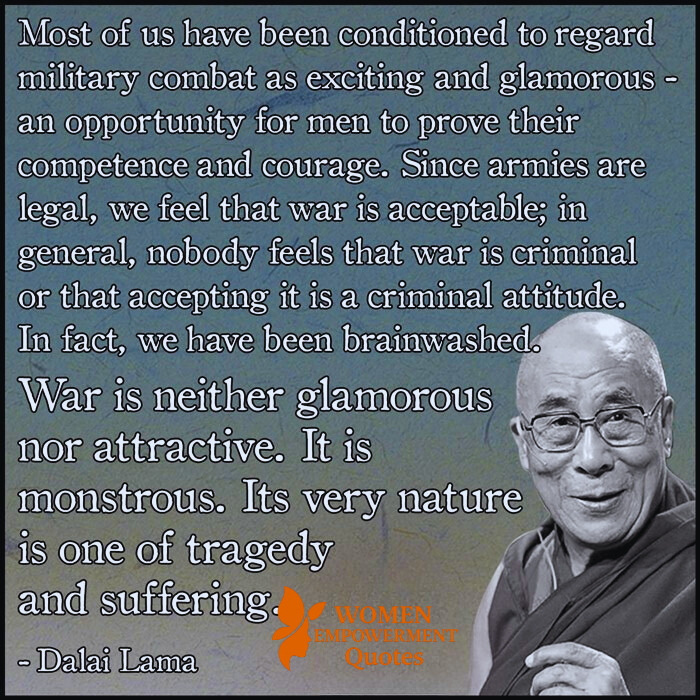
The False Allure of War: A Wake-Up Call for Humanity
For generations, war has been framed as a noble pursuit—glorified in books, films, and politics. Many grow up believing that military combat is a rite of passage, a thrilling display of bravery and patriotism. This conditioning shapes minds, making war seem honorable rather than tragic.
But as the Dalai Lama wisely points out, this belief is not only misguided—it’s dangerous. The truth beneath the surface is one of pain, loss, and trauma. The battlefield is not a stage for heroes but a place where lives are shattered, families broken, and humanity tested.
Behind every soldier is a soul often burdened with invisible wounds—grief, anxiety, and deep psychological scars. They return not as the triumphant figures seen in headlines, but as individuals struggling to reconnect with a world that no longer feels the same. Their pain doesn’t end with the war—it ripples into their homes, their communities, and across generations.
The danger lies in how normalized war has become. We’ve grown desensitized to violence, too often accepting conflict as inevitable. But we must confront a hard truth: when we glorify war, we silence the cry of those who suffer because of it.
A New Vision Rooted in Compassion
The Dalai Lama’s words offer a radical shift—a call to awaken our shared humanity. Rather than honoring violence, we must honor life. Peace is not a sign of weakness, but of profound strength. And real change begins when we reject war as a solution and commit to compassion, empathy, and cooperation.
We must learn to see not enemies, but fellow human beings. When we recognize the pain of others as our own, we build a bridge stronger than any army—one made of understanding.
The Dalai Lama’s Life: A Beacon of Peace
Exiled from his homeland as a young leader, the Dalai Lama faced oppression with courage—not by fighting back with weapons, but with love and resilience. Inspired by Gandhi’s philosophy of nonviolence, he became a global voice for peace, tirelessly advocating for Tibet’s freedom without ever resorting to hate.
His belief in nonviolence isn’t passive—it is active, powerful, and transformative. It teaches us that inner peace must precede global peace. Through mindfulness, compassion, and dialogue, he has shown the world that there’s a better way to heal our deepest divides.
Even in exile, even in heartbreak, he chose love over anger. And in doing so, he illuminated a path forward—not just for Tibet, but for us all.
A Final Reflection
In a world so often fueled by division, the Dalai Lama reminds us that peace is not a dream—it’s a responsibility. Let us stop feeding the illusion that war is glorious. Let us raise a new generation that finds courage not in weapons, but in wisdom.
Peace begins the moment we decide war is not an answer. And it becomes possible the moment we choose compassion over conquest.
Selected Quotes to Inspire a Shift in Perspective:
-
“War does not determine who is right – only who is left.” — Bertrand Russell
-
“Nothing will end war unless the peoples themselves refuse to go to war.” — Albert Einstein
-
“Send pens, not tanks. Send teachers, not soldiers.” — Malala Yousafzai
-
“War is hell.” — William Tecumseh Sherman
-
“I have witnessed the birth of a new world. It is difficult to believe I belong here.” — Yuri Gagarin
Would you like a shorter version for social media or video captions as well?